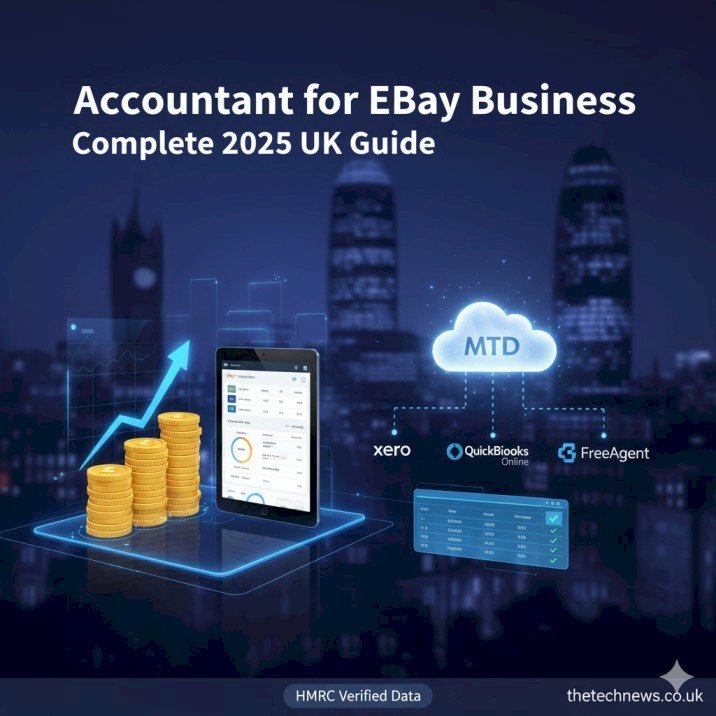Accountant for eBay Business | Complete 2025 UK Guide
Learn how UK eBay sellers can manage VAT, COGS, and MTD compliance in 2025. Expert guide on accounting, automation, and profit tracking.

In 2025, UK eBay sellers must balance profit tracking, VAT compliance, and Making Tax Digital rules while managing eBay’s Managed Payments system. This guide explains how to handle bookkeeping, COGS, automation, and tax responsibilities accurately—verified with HMRC and eBay UK sources.
Selling on eBay in the UK has become far more than a side hustle. Thousands of small businesses now use the platform as a full-time income stream. With that success comes complexity.
Listing fees, managed-payment deductions, VAT obligations and shifting regulations can make even a thriving store feel financially confusing. Many sellers mis-record income, fail to separate fees, or underestimate their tax liabilities.
This guide brings together verified information from HMRC, GOV.UK, and eBay UK to explain exactly how to keep compliant, profitable records in 2025.
How eBay’s System Affects Accounting
Unlike a retailer, eBay is a marketplace connecting sellers and buyers. Every transaction flows through eBay’s Managed Payments system. This means sellers no longer receive funds instantly via PayPal but instead through eBay’s internal payment service, which automatically deducts fees before paying out.
According to eBay UK, funds are normally available in your eBay balance within two business days of order confirmation, and bank transfers typically take up to four business days depending on your bank’s processing time ¹. This delay affects cash-flow timing and makes reconciliation essential.
Your eBay balance already includes deductions for final-value fees, insertion charges, advertising costs, and VAT collected on your behalf. Recording the net payout as total revenue understates sales figures and causes accounting errors.
Recording Revenue the Right Way
For small traders, HMRC allows cash-basis accounting, where income and expenses are recorded when money actually changes hands. However, as your eBay store grows, accrual accounting provides a more accurate view by matching each sale with its related costs in the same reporting period.
Accrual accounting aligns with the Making Tax Digital (MTD) framework and is the standard for VAT-registered businesses ². It ensures that eBay sales, platform fees, shipping costs and returns are all reflected in the correct period—giving you a true picture of profitability.
Understanding eBay Fees and Cost Impact
eBay’s fee structure directly influences your margins and must be accounted for precisely.
-
Insertion fees apply when you exceed the free listings included with your subscription.
-
Final-value fees are charged as a percentage of the total sale price (including shipping) and vary by product category.
-
Optional upgrade fees cover listing enhancements such as subtitles or premium templates.
-
Subscription fees—Starter, Basic, Premium, Anchor, or Enterprise—reduce per-item charges but add fixed monthly overheads.
Each of these must be recorded as an expense rather than deducted from revenue. Keeping them separate makes profitability analysis and VAT reporting far easier.
Managing Inventory and Calculating COGS
Your Cost of Goods Sold (COGS) includes everything you spend to acquire, prepare and deliver products: purchase costs, inbound shipping, packaging, storage, and restocking for returns.
Returned or damaged items should be adjusted in your books. If resellable, they return to stock at original cost; if not, they become a write-off.
HMRC permits consistent use of valuation methods such as FIFO (First In, First Out) or weighted average cost ³. Choose one and apply it consistently. Reliable inventory tracking also prevents stock discrepancies and supports correct COGS calculation for tax.
VAT Responsibilities and Making Tax Digital
In April 2024, the UK VAT registration threshold increased to £90,000 of taxable turnover within a rolling 12-month period ⁴. Once registered, you must charge VAT on taxable sales and can reclaim VAT on business purchases.
eBay acts as a Marketplace Facilitator, collecting and remitting VAT on many UK and cross-border transactions. However, you remain legally responsible for:
-
Keeping complete transaction and VAT records
-
Reporting gross sales on VAT returns, including those where eBay has already collected VAT
-
Handling exceptions, such as B2B sales or territories not covered by eBay’s collection rules
Since April 2022, every VAT-registered UK business must comply with Making Tax Digital. Records must be kept digitally and returns filed through HMRC-approved software such as Xero, QuickBooks Online, or FreeAgent ⁵. Paper or spreadsheet submissions no longer meet HMRC standards.
Income Tax and Record-Keeping Duties
If you trade with the intent to make profit, HMRC regards you as a business. Sole traders must file annual Self Assessment returns; limited companies must submit Corporation Tax returns through Companies House.
Keep all sales invoices, receipts, and digital VAT records for at least six years ⁵. Allowable business expenses include eBay fees, packaging, postage, subscriptions, and software licences. If you operate from home, you may claim a proportion of household costs.
Cash Flow and Payout Management
Managed Payments simplifies transactions but can disrupt cash flow. Because eBay deducts fees and VAT before paying you, the bank deposit rarely equals gross sales.
To stay liquid:
-
Forecast payouts based on eBay’s typical timing.
-
Set aside funds for VAT and tax obligations each month.
-
Maintain a small reserve for returns and disputes.
Automated accounting tools can reconcile each payout to its original sales, ensuring income appears in the correct accounting period and helping you predict future cash positions.
Automating eBay Accounting
Manual spreadsheets quickly become unmanageable as your sales scale. Automation eliminates repetitive work and supports MTD compliance.
Leading UK-ready tools include Xero and QuickBooks Online, both of which integrate with eBay via connectors such as Link My Books or A2X. These import sales, fees, VAT and COGS automatically.
More advanced, eCommerce-specific systems like Finaloop, Klavena, and Webgility offer real-time profitability tracking across multiple marketplaces, syncing eBay with Amazon or Shopify for unified reporting.
Automation delivers accuracy, speed, and instant visibility into performance—allowing you to focus on growth rather than spreadsheets.
Reconciling eBay Sales with Bank Records
Reconciliation verifies that your financial data matches the money received. Since eBay deducts multiple fees before payout, deposits rarely equal total sales.
Best practice is to reconcile monthly:
match each payout to individual sales, record every deduction, and confirm that VAT collected aligns with HMRC submissions.
Modern accounting software performs this automatically, maintaining an auditable trail in line with HMRC’s digital-record standards.
When to Hire a Professional Accountant
Once your turnover nears the VAT threshold or your operations span multiple sales channels, hiring an accountant familiar with eCommerce is wise.
A professional accountant can:
-
Configure your bookkeeping for MTD compliance
-
Optimise allowable expense claims
-
Prepare accurate VAT and tax returns
-
Provide strategic financial analysis for pricing and inventory decisions
Think of professional accounting as an investment in efficiency and peace of mind rather than a cost.
Preparing for the Future
Digital accounting is entering a new phase. Artificial intelligence now assists with demand forecasting and fraud detection, while API integrations allow near real-time synchronisation between eBay, banks, and accounting platforms.
The UK government is also expanding Making Tax Digital for Income Tax Self Assessment (MTD ITSA) to smaller traders in the coming years. Staying current with GOV.UK updates will ensure ongoing compliance.
Sellers who adopt automation early will find it easier to scale and remain audit-ready as regulations evolve.
Explore More: London’s Housing Crisis Hits Decade Low as Poverty and Exodus Surge
Conclusion
Accurate accounting is the foundation of every successful eBay business. In 2025, with Managed Payments, digital VAT filing and expanding MTD rules, financial management has become a strategic necessity.
By adopting accrual accounting, automating reconciliation, and keeping digital VAT records, sellers can track profitability precisely and stay fully compliant with HMRC. Professional accountants and integrated software remove uncertainty and free up time to grow the business.
In a marketplace defined by constant change, disciplined accounting remains the clearest path to long-term success.
Frequently Asked Questions (FAQ)
1. Do I need an accountant for my eBay business in the UK?
You don’t legally need an accountant, but it’s highly recommended once your eBay turnover approaches the VAT threshold (£90,000) or if you sell across multiple platforms. An accountant helps maintain Making Tax Digital compliance, manage VAT correctly, and ensure all allowable expenses and COGS are recorded for accurate profit and tax filing.
2. How do I keep accounting records for my eBay business?
HMRC requires eBay sellers to keep digital accounting records under Making Tax Digital for VAT. Use software such as Xero, QuickBooks Online, or FreeAgent to record income, expenses, and VAT. Keep digital copies of receipts and invoices for at least six years. Automated integrations like Link My Books or A2X can import eBay transactions directly.
3. Does eBay automatically collect and pay VAT in the UK?
Yes, eBay collects and remits VAT on many UK and cross-border transactions as a Marketplace Facilitator. However, you’re still responsible for keeping full transaction records, reporting total sales on VAT returns, and managing any B2B or non-covered transactions where VAT may still apply. Always verify collection details in your Seller Hub VAT reports.
4. How are eBay payments handled under Managed Payments?
Under eBay Managed Payments, funds are typically available in your eBay balance within two business days after the buyer pays, with bank transfers completing in up to four business days depending on your bank. eBay deducts fees and VAT before paying you, so your deposit will be lower than total sales. Accurate reconciliation ensures books stay correct.
5. What expenses can I claim as an eBay seller?
You can claim any legitimate business expense related to running your eBay store, including eBay fees, postage, packaging, inventory, marketing, software, and professional accounting services. If you work from home, you can claim a proportion of household bills. Always retain digital receipts and ensure all expenses are wholly and exclusively for business use.
6. What’s the best accounting software for eBay sellers in the UK?
For UK eBay sellers, Xero and QuickBooks Online are the most widely used and Making Tax Digital–compliant. Both integrate seamlessly with eBay through tools such as Link My Books, A2X, or Webgility, automatically importing sales, fees, VAT, and COGS. These integrations eliminate manual entry and simplify tax filing.
7. What happens if I don’t register for VAT on eBay?
If your rolling 12-month taxable turnover exceeds £90,000 and you fail to register, HMRC may impose backdated VAT charges and penalties. Even if eBay collects VAT on your behalf, you still need to register and file returns once you cross the threshold. It’s best to monitor turnover monthly to avoid missing registration deadlines.
8. Is accrual or cash accounting better for eBay sellers?
Accrual accounting gives a clearer view of profit by matching income and expenses in the same period. It’s best for growing or VAT-registered sellers. Cash accounting is simpler and may suit smaller sellers with turnover under £150,000. Check HMRC’s guidance or ask your accountant before choosing a method.
9. How long should I keep eBay accounting records?
HMRC requires VAT-registered businesses to retain records for six years. This includes invoices, receipts, bank statements, and digital VAT files. Records must be kept electronically if you fall under Making Tax Digital. Cloud accounting software automatically stores this data securely for compliance and audit purposes.
10. Can I use eBay reports for tax filing?
Yes, eBay’s Seller Hub provides transaction and payout reports, but they don’t replace full accounting records. You must import these into accounting software to separate income, VAT, and expenses accurately. Automated integrations ensure data is categorised properly and prevent under- or over-reporting to HMRC.

 AnniWeston
AnniWeston 












